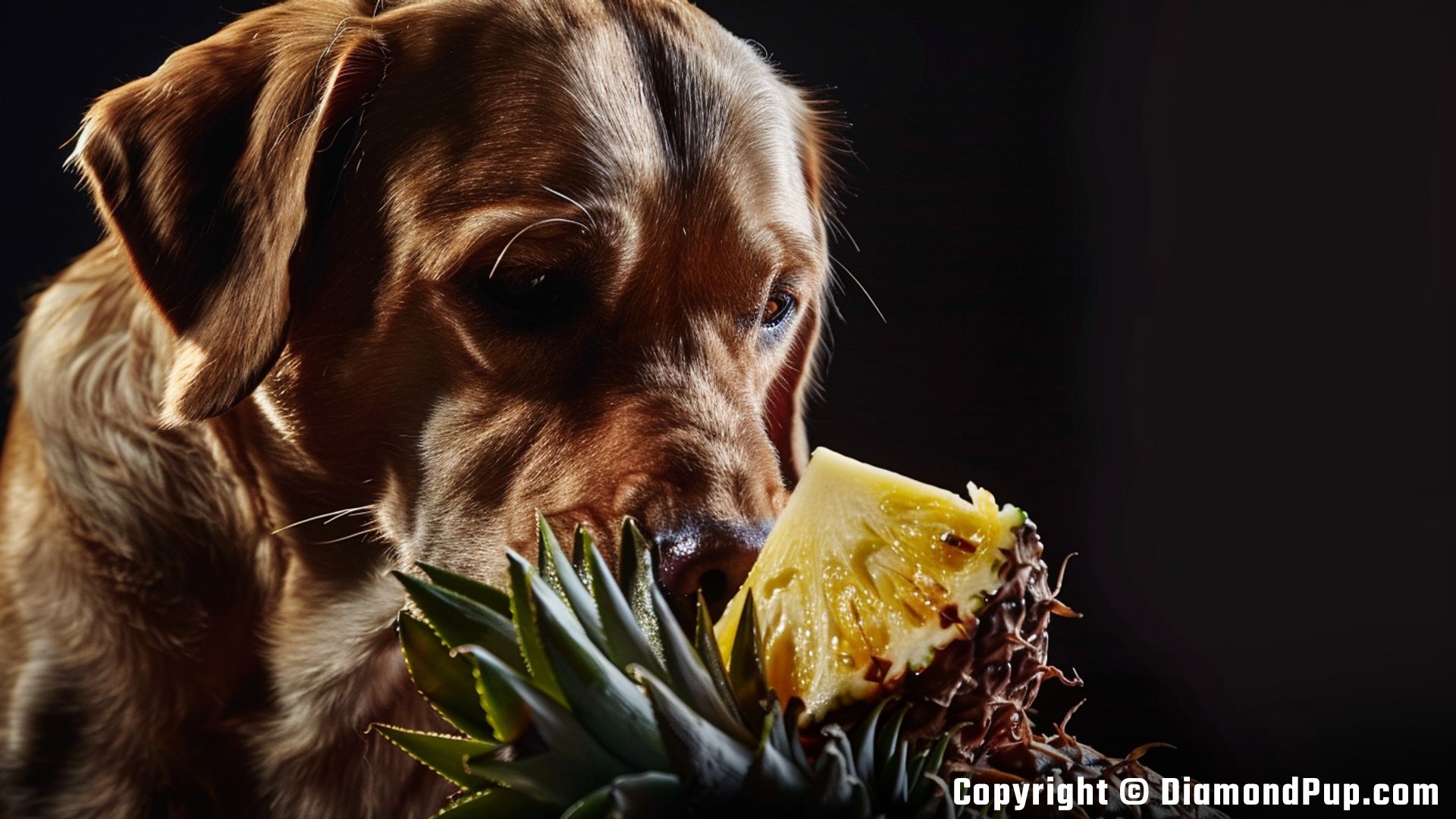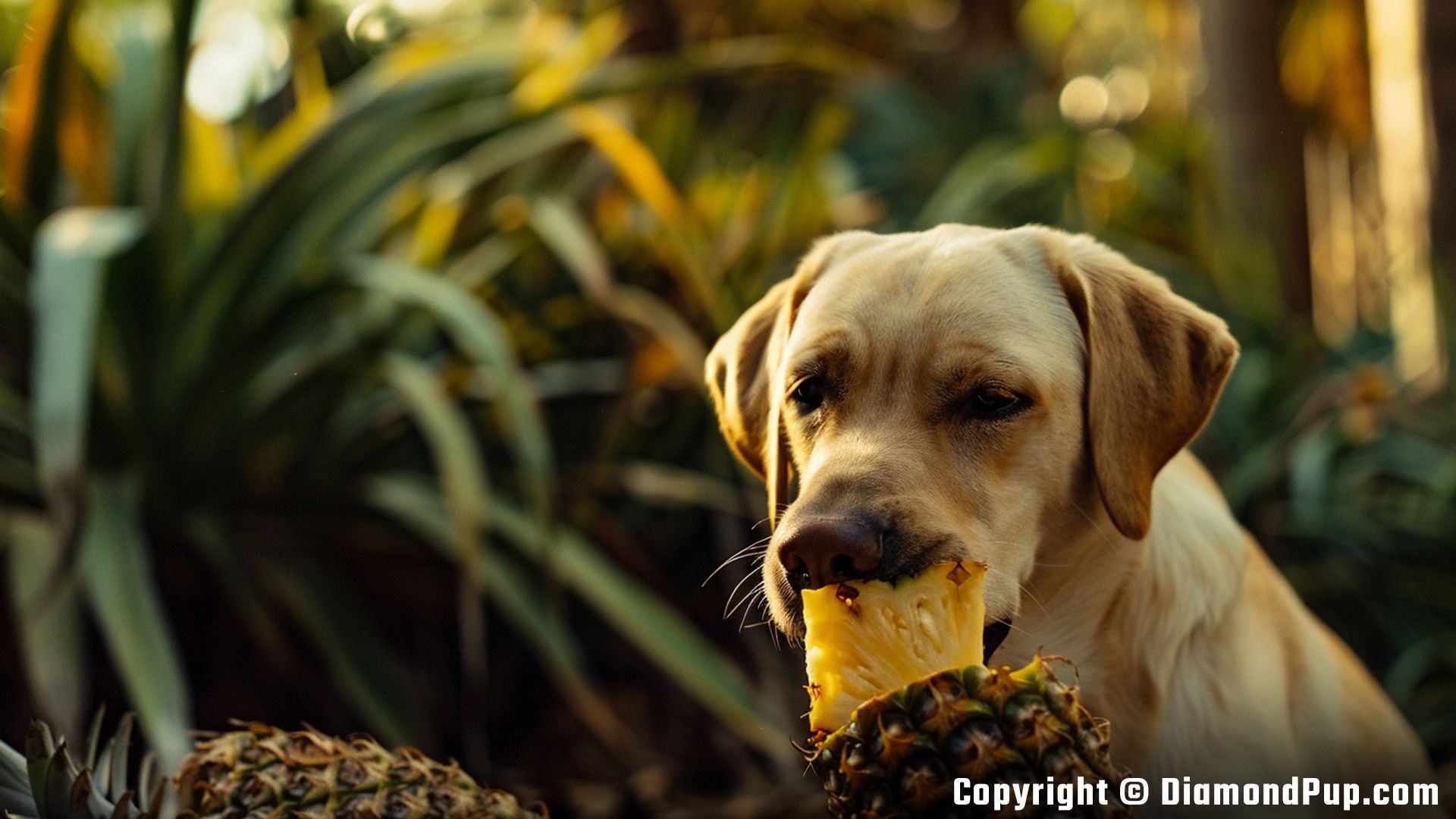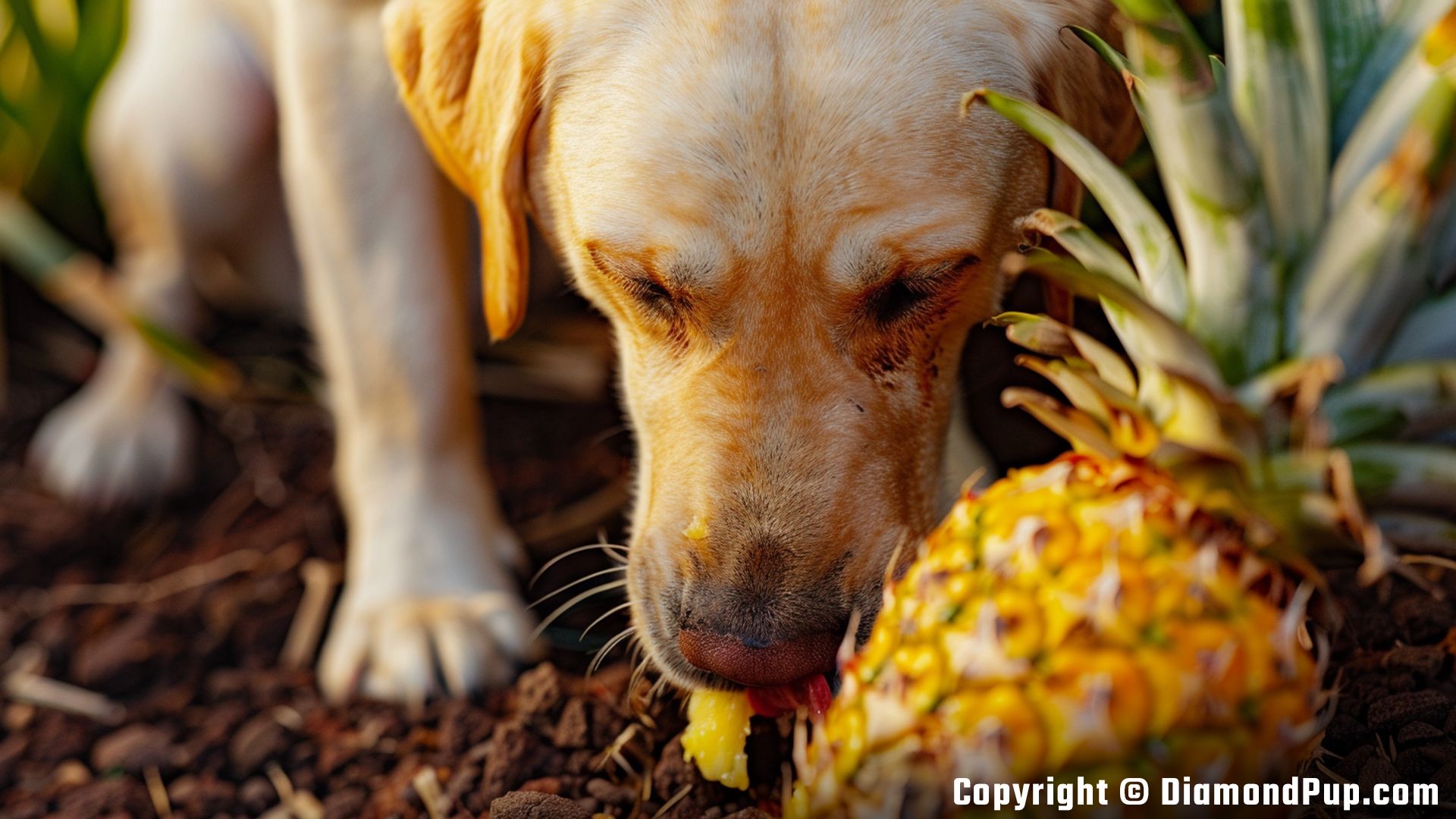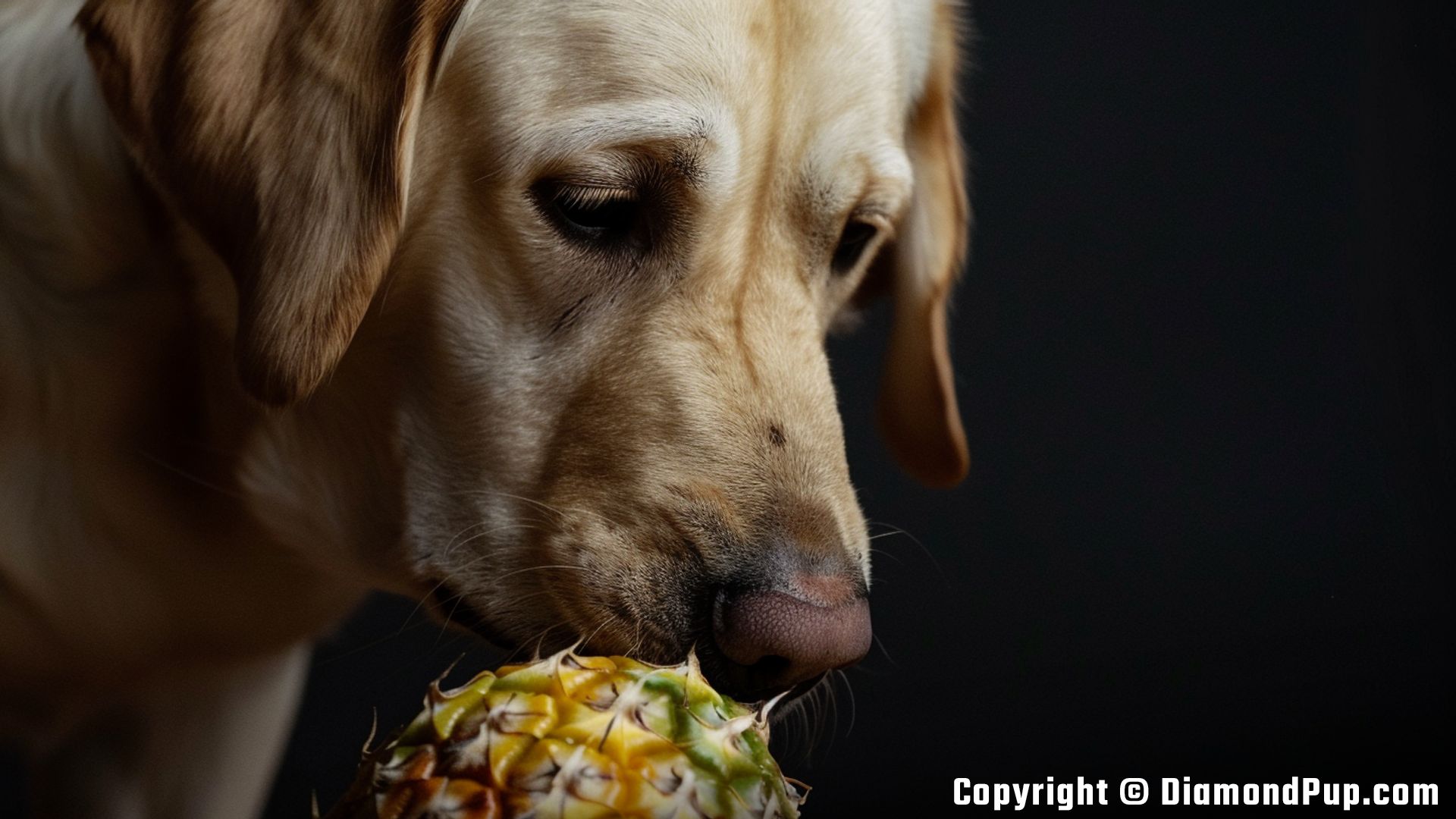Can a Labrador Eat Pineapple?
Date Published: February 16, 2024 | Last Modified: February 17, 2024
Let's start by dispelling a common myth - indeed, labradors can indulge in the tropical delight of pineapple! In this article, we will delve into the health benefits that pineapple can offer your beloved canine companion, as well as the potential pros and cons of incorporating this fruit into their diet. Safety concerns, or the lack thereof, will be carefully examined to make sure you can confidently share this treat with your furry friend. We will also address the question of whether pineapple is toxic to Labradors and explore if it can be a nutritious addition to their meals. So sit back, relax, and let's navigate the world of pineapples and Labradors together.

Are Pineapples Good for Labradors?
Pineapples can be a wonderful addition to a Labrador's diet due to their high vitamin C content, which can help boost your dog's immune system and promote overall health. This tropical fruit is also rich in dietary fiber, which can aid in digestion and keep your pup feeling full and satisfied. Additionally, pineapples contain bromelain, an enzyme that may have anti-inflammatory properties and benefit your dog's joint health.
However, it is important to feed pineapples to Labradors in moderation, as they are high in natural sugars that can lead to gastrointestinal upset if consumed in large quantities. Be sure to remove the tough, outer skin and spiky core before offering this tasty treat to your furry friend to avoid any choking hazards. Overall, when fed in appropriate amounts, pineapples can be a healthy and delicious snack for your Labrador.

Understanding the Benefits of Pineapples for Labradors
Labradors can benefit from the inclusion of pineapples in their diet due to the fruit's rich source of essential vitamins and minerals. Pineapples are packed with Vitamin C, which can help boost the immune system of your Labrador, making them more resilient to illnesses. Additionally, pineapple contains bromelain, an enzyme that has anti-inflammatory properties and can aid in digestion for your furry companion. This can be particularly helpful for Labradors who may have sensitive stomachs or digestive issues.

Nutritional benefits of Pineapples for Labradors
Pineapples are a fantastic source of essential nutrients for Labradors. This tropical fruit is rich in vitamins C, A, and B6, which can help boost your pup's immune system, promote healthy skin and coat, and support overall well-being. Additionally, pineapples contain bromelain, an enzyme that aids in digestion and can help reduce inflammation, making it a great choice for dogs with sensitive stomachs or joint issues.
When choosing pineapples for your Labrador, opt for fresh, ripe fruit without any added sugars or harmful preservatives. You can offer your pup small, bite-sized pieces of pineapple as an occasional treat or mix it into their regular meals for a flavorful and nutritious twist. Remember, moderation is key to prevent any digestive upsets due to the high fiber content of this fruit.

Safely Introducing Pineapples to Your Dog's Diet
When introducing pineapple to your Labrador's diet, it is important to start slowly and in small amounts. This will help you monitor how your dog's digestive system reacts to the new fruit. Begin by offering a few small bites of fresh pineapple and observe for any signs of gastrointestinal upset such as diarrhea, vomiting, or gas. If all goes well, you can gradually increase the amount over time.
It is essential to remove the tough outer skin and the core of the pineapple before feeding it to your Labrador, as these parts can be difficult for them to digest. Opt for fresh pineapple over canned varieties, as they often contain added sugars and preservatives that are not beneficial for your dog's health. Remember, moderation is key when adding any new food to your dog's diet, including the delicious tropical treat of pineapple.

How much pineapple can a dog eat safely?
When it comes to feeding your Labrador pineapple, moderation is key. While pineapple can be a healthy and tasty treat for your furry friend, it should only be given in small amounts. A few small pineapple chunks as an occasional snack is a safe way to introduce this fruit into your dog's diet without causing any digestive upset.
As a general guideline, it is recommended to limit pineapple intake to no more than 10% of your dog's daily food consumption. This will help prevent any potential stomach issues or diarrhea that may arise from feeding too much pineapple at once. Remember to always consult with your veterinarian before making any significant changes to your dog's diet, including introducing new foods like pineapple.

Tips to Remember When Feeding Your Dog Pineapples
When feeding your Labrador pineapples, it is important to remember a few key tips. Firstly, always make sure to remove the tough outer skin and prickly core of the pineapple to prevent any choking hazards or digestive issues for your furry friend. Secondly, start with small portions to gauge how your dog reacts to this new treat. Introduce pineapple gradually into their diet to monitor for any signs of stomach upset or allergies. Additionally, opt for fresh pineapple over canned or prepackaged varieties, as they may contain added sugars or preservatives that are not suitable for your dog's health. By following these tips, you can safely incorporate pineapple into your Labrador's diet as a tasty and nutritious snack option.

Feeding Your Dog Pineapples
When it comes to feeding your Labrador pineapples, it's important to do so in moderation. While pineapples are safe for Labradors to eat, the high sugar content in this tropical fruit can potentially cause digestive issues if consumed in large quantities. It's best to feed your Labrador small, bite-sized pieces of fresh pineapple as an occasional treat rather than a regular part of their diet. Additionally, it's crucial to remove the tough outer skin and prickly core of the pineapple before offering it to your furry friend to prevent any choking hazards.

How to properly feed your dog Pineapples
When feeding your Labrador pineapple, it is important to do so in moderation. Start by introducing small amounts of fresh pineapple to ensure that your dog tolerates it well without any digestive upset. Remove the tough, outer skin and the core of the pineapple before offering it to your furry friend, as these parts can be difficult to digest. Additionally, consider cutting the pineapple into bite-sized pieces to prevent choking hazards.
Make sure to serve pineapple as an occasional treat rather than a regular meal replacement. Monitor your dog for any signs of allergies or sensitivities after consuming pineapple, such as itching, vomiting, or diarrhea. And always consult with your veterinarian if you have any concerns about introducing pineapple or any new food into your Labrador's diet.

Do Labradors Like Pineapples?
Labradors are known for their love of food, and pineapple can be a refreshing and tasty treat for them. The sweet and tangy flavor of pineapple may appeal to many Labradors, making it a fun and enjoyable snack option. Some Labradors may prefer their pineapple chunks fresh and raw, while others may enjoy them frozen for a cool and soothing treat on a hot day. It's important to monitor your Labrador's reaction to pineapple and ensure they don't have any adverse gastrointestinal effects such as diarrhea or vomiting.

Special Consideration for Labradors
Labradors are known for their big appetites and tendency to gain weight if not monitored closely. When feeding your Labrador pineapple, it's important to consider the sugar content of the fruit. While pineapple can be a healthy snack in moderation, the high sugar content can contribute to weight gain and potential digestive issues if consumed in large amounts.
It's recommended to offer pineapple to your Labrador as an occasional treat or as part of a well-balanced meal. Monitor their intake to ensure they maintain a healthy weight and consult with your veterinarian if you have any concerns about incorporating pineapple into their diet.

Can Puppies Have Pineapples?
As a veterinarian nutritionist, I recommend introducing pineapples into your Labrador puppy's diet gradually. Pineapples are rich in vitamins, minerals, and fiber, which can benefit your growing pup's overall health. However, due to their high fiber content, feeding too much pineapple to a young puppy may lead to gastrointestinal upset such as diarrhea. Start by offering small amounts of fresh pineapple as a treat, and monitor your puppy's response to ensure they tolerate it well.
Remember to always remove the tough core and prickly skin of the pineapple before serving it to your puppy. Additionally, it's important to balance their diet with high-quality puppy food specifically formulated for Labrador puppies to meet their unique nutritional needs during this crucial growth stage.

Are there any Labradors that shouldn't eat Pineapples?
While pineapples are generally safe for Labradors to consume, there are a few exceptions. Labradors with a history of gastrointestinal issues, such as chronic pancreatitis or sensitive stomachs, may not react well to the high acidity of pineapples. It's essential to introduce this fruit slowly into their diet and monitor for any signs of digestive upset such as vomiting, diarrhea, or excessive gas.
Additionally, Labradors with certain medical conditions like diabetes should consume pineapples in moderation due to the natural sugar content in the fruit. Consult with your veterinarian before adding pineapple to your diabetic Labrador's diet to ensure it aligns with their specific nutritional needs and health goals.
Recipes for Feeding Your Dog Pineapples
When it comes to feeding your Labrador pineapples, there are a few different options you can consider. One simple way is to offer small bite-sized pieces of fresh pineapple as a tasty treat. Alternatively, you can mix diced pineapple with your dog's regular food to add some natural sweetness and extra fiber to their meal. Remember to remove the tough core and spiky skin of the pineapple before serving it to your furry friend, as these parts can be difficult for them to digest. Overall, moderation is key when it comes to feeding pineapple to your Labrador, as too much can lead to digestive upset.
Alternatives to Pineapples for Labradors
While pineapples can be a healthy addition to your Labrador's diet, it's important to remember that moderation is key. If you're looking for alternative fruits to offer your Labrador, consider options like apples, blueberries, or strawberries. These fruits are also packed with vitamins, minerals, and antioxidants that can benefit your dog's overall health. Just like with any new food, make sure to introduce these alternatives gradually to monitor for any potential digestive issues.
Common Questions About Labradors and Pineapples
One common question that arises when considering feeding pineapple to Labradors is how much is too much. While pineapple can be a healthy and tasty treat for your canine companion, moderation is key. Too much pineapple can lead to digestive upset due to its high fiber content and natural sugars. It's best to start with small amounts and monitor your dog's reaction before incorporating it regularly into their diet.
Another important question is regarding the form of pineapple to feed your Labrador. Fresh pineapple is the ideal choice, as canned pineapple often contains added sugars and preservatives that can be harmful to dogs. Make sure to remove the tough, prickly skin and core of the pineapple before offering it to your furry friend to prevent any choking hazards or digestive issues.
Subscribe Now
Stay updated with the latest news and articles! We'll keep you updated on the latest tips for your pet Labrador
